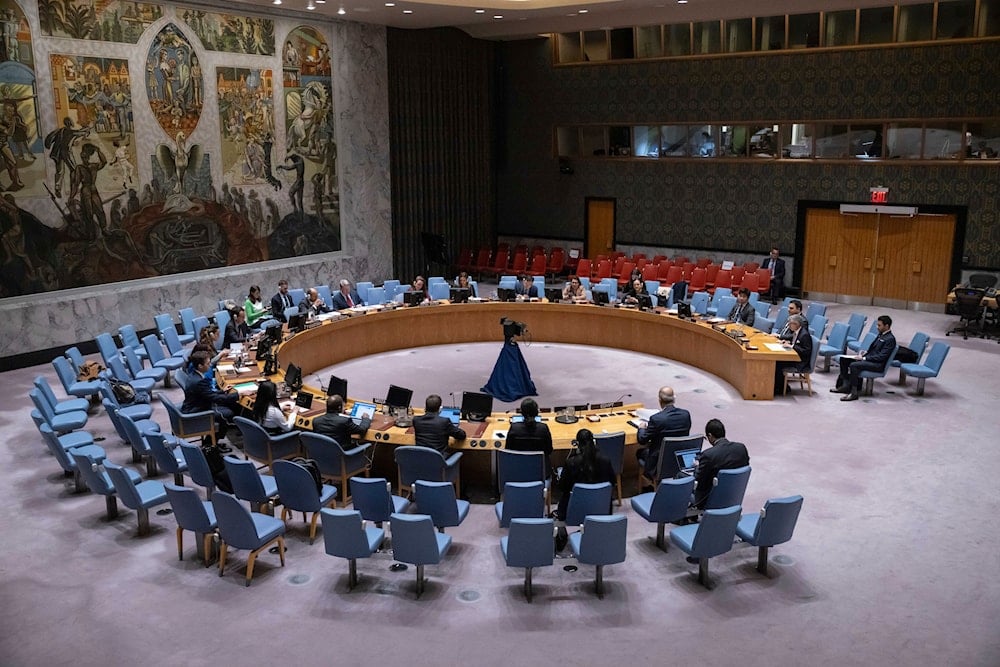For fourth time US vetoes UNSC resolution advocating ceasefire in Gaza
The United States has once again used its veto power at the United Nations Security Council to block a resolution advocating for a ceasefire in Gaza.
-

A general view shows a Security Council meeting at United Nations headquarters, on November 19, 2024. (AP)
The United States vetoed on Wednesday a UN Security Council resolution calling for a ceasefire in Gaza amid the ongoing Israeli war on the Strip, accusing other council members of cynically dismissing efforts to find a compromise.
The 15-member council voted on a resolution proposed by the ten non-permanent members, which called for an "immediate, unconditional, and permanent ceasefire" and demanded the release of captives. The US was the sole member to oppose the resolution, using its veto power as a permanent council member to block it.
A senior US official, speaking on the condition of anonymity before the vote, stated that the US would only support a resolution that specifically demands the immediate release of captives as part of any ceasefire agreement.
"As we stated many times before, we just can't support an unconditional ceasefire that does not call for the immediate release of hostages," the official said.
Ahead of the vote, the UK proposed new language that the US was willing to support as a compromise, but it was ultimately rejected, according to the US official.
It is worth noting that before the session and during the drafting process, which extended late into the night, "the United States objected to a clause referencing the provisional measures ordered by the International Court of Justice (ICJ)" against the Israeli regime, including the cessation of hostilities in Rafah, sources told Al Mayadeen.
The language was eventually revised to "delete any direct reference to the ICJ’s provisional measures but retained a statement affirming respect for the ICJ and its functions," as a compromise.
Moreover, the final draft resolution did not include a US request for "language establishing a permanent mechanism to review allegations raised by Israel regarding alleged ties between UNRWA staff and Hamas."
The US veto comes as the Israeli occupation continues its genocidal campaign against the Gaza Strip, killing 43,985 and injuring 104,092 since October 7. The Gaza Health Ministry announced that on the 411th day of genocide in Gaza, in 24 hours, the Israeli military committed two massacres, resulting in 13 martyrs and 84 injuries, with many victims still trapped under rubble or out of reach due to Israeli bombardment.
UNSC resolution for Gaza ceasefire
Earlier in June, the UNSC adopted a resolution welcoming the Gaza ceasefire proposal put forth by US President Joe Biden. The resolution, drafted by the United States, received overwhelming support, with 14 members voting in favor and Russia abstaining.
The ceasefire proposal, announced by Biden on May 31, outlines a new three-phase plan aimed at achieving "a lasting cessation of hostilities" in the Gaza Strip and the release of all captives held by Hamas.
Hamas welcomed the ceasefire proposal. "We welcome the contents of the Security Council resolution regarding a permanent ceasefire in Gaza, complete withdrawal, the return of displaced persons, and reconstruction."
However, Hamas' position was rendered obsolete after the Israeli government derailed the negotiations and rescinded its initial approval of Biden's proposal.
This is the fourth time that the United States has vetoed UNSC resolutions on issues relating to Palestine, during the period of the war on Gaza. The US vetoed four resolutions on a ceasefire in Gaza and a resolution on the international recognition of the State of Palestine as a member of the United Nations.
G20 demands reform of international system, ceasefire in Gaza, Lebanon
In a related context, on Tuesday, the Group of 20 (G20) called for a ceasefire in the Gaza Strip and Lebanon after a summit held in Rio de Janeiro, Brazil.
The G20 Leaders' final statement delved into a series of topics, namely sustainability, the environment, and reform of the international system.
On the Israeli wars on Gaza and Lebanon, G20 leaders expressed their "deep concern about the catastrophic humanitarian situation in the Gaza Strip and the escalation in Lebanon."
They emphasized the need to expand humanitarian aid and protect civilians in affected regions.
Moreover, G20 leaders affirmed "the Palestinian right to self-determination," underlining their commitment to the "vision of the two-state solution, where Israel and a Palestinian state live side by side in peace within secure and recognized borders."

 4 Min Read
4 Min Read










